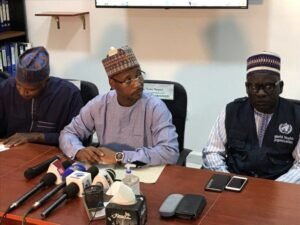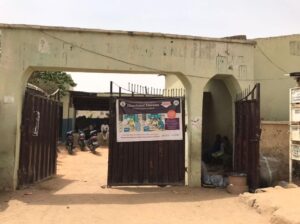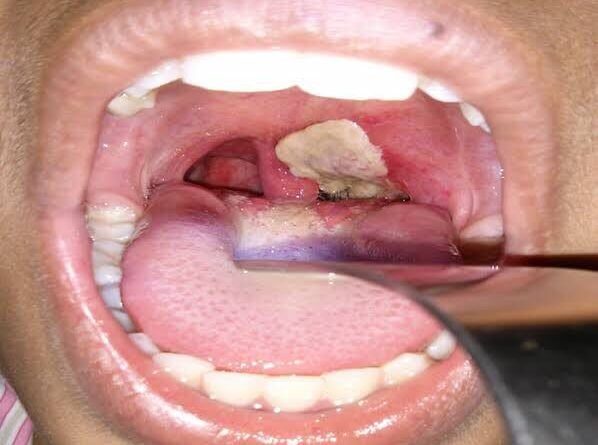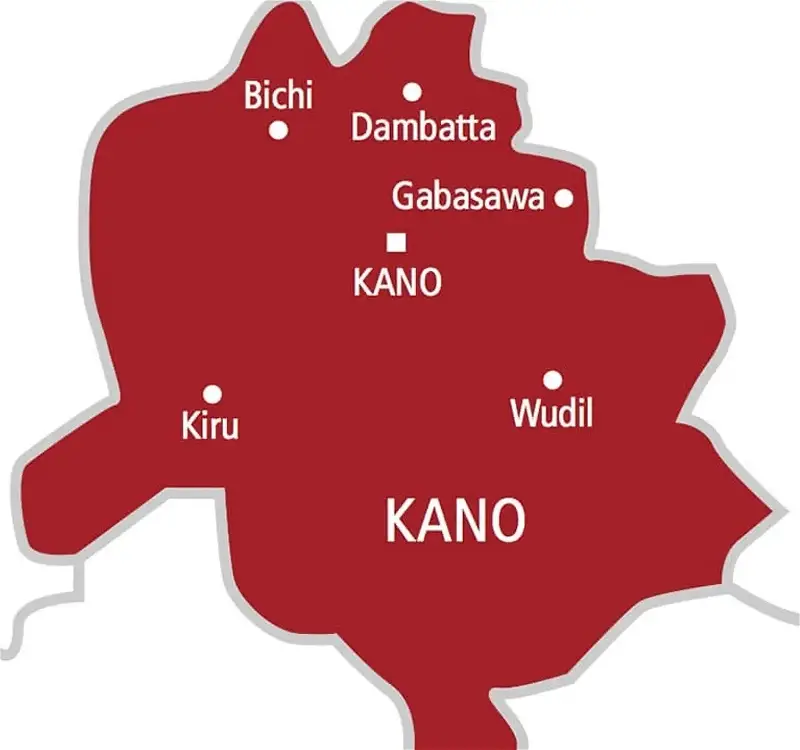Kano State’s Prudent Funds and Technical Working Groups Prove Vital in Tackling Diphtheria Outbreak
By Mustapha Salisu Yakubu
In Kano State, several communities have been grappling with an outbreak of Diphtheria, a highly contagious bacterial infection that affects the throat and nose, causing difficulty in breathing. If left untreated, it can be fatal. Outbreaks of the disease often occur in areas with poor vaccination coverage. However, in Kano State, the prudent utilization of sustainable funds allocated for epidemic preparedness and response, as well as the establishment of disease-specific Technical Working Groups (TWGs), have played a significant role in mitigating the impact of the disease. Mustapha Salisu Yakubu reports.
Amina Garba, a dedicated public health worker at the Ja’en Primary Health Centre in Gwale Local Government, Kano State, shared her personal experience of how her husband fell victim to the Diphtheria virus. It happened just a week after she had received specialized professional training on identifying and combating the Diphtheria virus, aiming to enhance her service delivery at the Primary Health Centre.
Recalling the incident, Amina said, “It was during the month of Ramadan when I was at work. My husband called and informed me that he was seriously ill, experiencing difficulty in swallowing saliva.”
Amina explained that when she finished her work in the evening, she went straight to the kitchen to prepare the meal for Iftar (the Ramadan breakfast). Consequently, she couldn’t assess the severity of her husband’s condition at that time. “It was in the morning when I checked his health by asking him to open his mouth, and to my astonishment, I saw the characteristic patches that were contributing to his difficulty in breathing, accompanied by a very high fever.”
Drawing from the knowledge she had acquired during her training, Amina suspected that her husband had contracted Diphtheria. She immediately took him to the Ja’en Primary Health Centre, where her colleagues, who had also undergone the same training, confirmed the diagnosis. “We were then referred to Murtala Specialist Hospital for proper treatment.”
At Murtala Specialist Hospital, Amina’s husband underwent further testing, and the Diphtheria infection was confirmed. He was admitted to the isolation centre within the facility. “I was questioned for contact tracing, tested, and vaccinated, along with our children, as our results turned out to be negative,” Amina disclosed.
Amina went on to explain that all the necessary medications, laboratory tests, injections, and other services, including food, were provided free of charge to them. Her husband has since been discharged, vaccinated, and is now on a weekly appointment schedule to see his doctor for regular check-ups.
What is Diphtheria?
Diphtheria is an infection caused by the bacterium Corynebacterium diphtheriae, as defined by the World Health Organization (WHO). The infection typically manifests with signs and symptoms that appear 2 to 5 days after exposure and can range from mild to severe.
The initial symptoms often develop gradually and may include a sore throat and fever. In more severe cases, the bacteria produce a toxin that gives rise to a thick grey or white patch at the back of the throat. This patch can obstruct the airway, making breathing and swallowing difficult, and may also cause a distinctive barking cough. Additionally, the neck may swell due to enlarged lymph nodes.
Complications can arise when the toxin enters the bloodstream. These complications may include inflammation and damage to the heart muscle, inflammation of nerves, kidney problems, and bleeding issues caused by low blood platelet levels. The damage to the heart muscle can lead to an abnormal heart rate, while inflammation of the nerves can result in paralysis.
Diphtheria Hits Kano
Kano State, known as the commercial hub of Nigeria, has been severely affected by the Diphtheria virus. This infectious disease primarily targets children under the age of 15, although cases among adults have also been reported. Unfortunately, there have been numerous deaths resulting from the outbreak in the state.
Dr. Aminu Ibrahim Tsanyawa, the State Commissioner for Health, revealed during a press briefing on January 21, 2023, that as of January 20, 2023, approximately 100 suspected cases of Diphtheria infection had been recorded across 13 Local Government Areas (LGAs) in Kano State namely: Ungoggo, Nassarawa, Bichi, Dala, Dawakin Kudu, Fagge, Gwale, Kano Municipal, Kumbotso, Rano, Dawakin Tofa and Gwarzo respectively.
Tsanyawa however, revealed Diphtheria is a vaccine preventable disease and its antigen is among the pentatonic vaccine (PETA) taken 3 times (PENTA 1 – 3) before the age of 1 year.

However, in a report by Channels TV in March 2023, it was stated that as of January 22, 2023, at least 61 individuals had died due to the outbreak of Diphtheria across the 13 local government areas in Kano State. This information was disclosed by Salma Suwaid, the state’s Diphtheria manager, during a webinar organized by the Nigeria Centre for Disease Control (NCDC).
Prior to the announcement of the infectious disease in Kano, it was reported that over 400 cases had been recorded, primarily among the elderly population in the state.
According to a report by the World Health Organization (WHO) in December 2022, the Nigeria Centre for Disease Control and Prevention (NCDC) was informed of suspected Diphtheria outbreaks in Kano and Lagos States. From May 14, 2022, to April 9, 2023, a total of 1,439 suspected cases were reported, out of which 557 (39%) were confirmed, and there were 73 deaths among the confirmed cases, resulting in a case-fatality ratio of 13%.
Primary Health Care EPR Tactics…
During an interview with PRIME TIME NEWS, Yusuf Adamu Muhammad, the Ward Technical Officer/In-Charge of Kabuga Primary Health Center (PHC), provided insights into the EPR (Emergency Preparedness and Response) tactics employed by their facility. In the event of receiving a case of Diphtheria, they begin by conducting a physical assessment of the patient to determine the severity of their condition.
“If the case is confirmed, we initiate first-line treatment to alleviate the patient’s severe pain. However, if the situation exceeds our capacity, we follow a pre-referral protocol and refer the patient to the Diphtheria Treatment Unit (DTU) at Murtala Muhammad Specialist Hospital, Kano, for advanced treatment,” explained Yusuf.
He further mentioned that their facility has a surveillance officer responsible for contacting the Disease Notification Officer to investigate the case and authorize the referral process.
Yusuf disclosed that the Kano State Contributory Health Care Management Agency (KSCHMA) funds play a crucial role as a collective resource for combating epidemic outbreaks. The funds are utilized to develop quarterly and yearly plans in collaboration with stakeholders to identify potential outbreaks and establish a preparedness strategy using the available resources.
“For example, with the approach of the rainy season, we anticipate an increase in malaria patients among our clientele. Therefore, we proactively allocate resources to address this anticipated incident,” he noted.

Ahmed Adamu Diso, the IOC (In-Charge) of Ja’en PHC, represented by his 2IC, Ubaidu Alhassan Yahaya also praised the KSCHMA funds as a sustainable intervention benefiting most PHCs in Kano state. Although Ja’en PHC is yet to be included in the KSCHMA funds, he mentioned that the first case of Diphtheria recorded at his facility occurred shortly after receiving on-the-job training from the World Health Organization (WHO).
“When we received a report of the index case at our PHC, we applied the knowledge acquired from our recent training by administering immunization,” said Ahmed.
“Having confirmed the case, I contacted our disease surveillance officer, who requested data on the suspect for contact tracing purposes. Subsequently, we referred the suspect to the Diphtheria Treatment Unit (DTU) at Murtala Muhammad Specialist Hospital, Kano, for further support, considering our PHC’s limited capacity, which primarily focuses on immunization,” Adamu explained.
About 11 Siblings Hit By Diphtheria, Witness Narrates…
For Nasir Muhammad Nasir, a resident of Bachirawa, Rijiyar Lemo, shared his account of the early stages of the diphtheria outbreak with PRIME TIME NEWS. He explained that initially, about 11 siblings from the same household were affected by the virus, resulting in the deaths of three of them in mid-January 2023.
According to Nasir, the first person to be affected by diphtheria in their community was a 7-year-old girl named Ilham, who lived next door. Unfortunately, even before the disease was identified as an epidemic, Ilham experienced symptoms and sought medical attention. However, the hospital was unable to diagnose her condition and only provided injections for temporary relief. Sadly, Ilham passed away despite these efforts.
“Shortly after Ilham’s death, the virus spread to Nasir’s own home, infecting a 3-year-old boy named Muhammad and a 7-year-old girl named Siyama. Nasir’s family chose not to take them to the hospital, fearing a similar outcome as Ilham. Muhammad’s health began to deteriorate rapidly, and he was eventually taken to the hospital, where he was recommended to receive a drip. However, Muhammad passed away that same night after returning home from the hospital”
“Only two days after Muhammad’s death, Siyama’s condition worsened, and white patches began to appear at the back of her throat. A traditional herbalist known as a Wanzami in the Hausa language was called to perform an operation to remove the patches. Unfortunately, Siyama also succumbed to the pain of the operation and passed away” he revealed.
PRIME TIME NEWS gathered that Following the mysterious deaths of these three children, the community became alarmed and realized that they were facing an epidemic. They recognized the need for immediate action to prevent further spread. Shortly thereafter, three more children from Nasir’s home, along with an 18-year-old female teenager, were affected by diphtheria. They were taken to Waziri Gidado Hospital but were subsequently referred to Murtala Muhammad Specialist Hospital, which had established a unit to combat diphtheria.
Nasir explained that at Murtala Specialist Hospital, the affected individuals were isolated and received free medical treatment, including immunization. After receiving appropriate care, they were discharged from the hospital.
Nasir also provided the identities of other individuals in their home who were affected by the diphtheria disease, namely Rabiu (3 years old), Umar (8 years old), Abubakar (10 years old), Ibrahim, and an infant named Muhayin.
“In response to the outbreak, the community united in their efforts to combat diphtheria. They mobilized people to visit Murtala Specialist Hospital for check-ups, even if they didn’t exhibit symptoms of the disease. Additionally, an influential lady in the community facilitated the immunization of the entire community, with the support of stakeholders. This immunization campaign was successful, and as a result, the community is now free from the diphtheria disease.” Nasir disclosed.
Swift Government Intervention
Government intervention in Kano State has been crucial in addressing the Diphtheria outbreak. Dr. Abdullahi Isa Kauran Mata, the State Epidemiologist and Polio Incident Manager informed PRIME TIME NEWS that the state’s Emergency Preparedness and Response Committee (EPR Committee) has been reactivated to combat the spread of Diphtheria.
The EPR Committee is led by the state Commissioner for Health and comprises members from technical and professional backgrounds, including development partners in the state.
Dr. Kauran Mata further explained that disease-specific Technical Working Groups (TWGs) have been established for infectious diseases such as monkeypox, measles, cholera, and Diphtheria. These TWGs actively track information related to these diseases on a daily basis, even in the absence of an outbreak.
“The TWG for Diphtheria works almost on a daily basis, coordinating with various pillars using global standards in handling epidemic cases. They utilize the Incident Management Structure (IMS) and Implementation Action Plan (IAP), collaborating with development partners for concept handling mobilization. The TWG has a structure across all 44 Local Government Areas (LGAs) for enhanced risk surveillance, with a surveillance and notification officer serving as the coordinator,” he said.
Each major hospital has a surveillance focal person, along with a notification officer. They work together to track information, and if a suspected case arises, the TWG is promptly updated. Dr. Kauran Mata explained that a team is dispatched to investigate, collect samples, send them to the laboratory for diagnosis, isolate the affected individual at a designated isolation centre if necessary, and sensitize neighbouring communities about the case.
When asked about funding for Epidemic Preparedness and Response, Dr. Kauran Mata emphasized Kano State’s proactive approach. He stated, “Kano state is the only state with a standing order of monthly release of N3 Million to the state Epidemiology unit for EPR activities through the State Health Trust Fund (KHETFUND)”
“Against this backdrop, the Kano State Government has steadfastly pursued a range of notable initiatives aimed at enhancing primary healthcare within the state. These include the establishment of the State Health Trust Fund (KHETFUND) and the Kano State Contributory Health Care Management Agency (KSCHMA), both of which have made substantial contributions to the advancement of healthcare services” Kauran Mata elucidated.
In addition to the state government’s financial commitment, the Ministry also receives support from partner organizations such as the World Health Organization (WHO), UNICEF, and Médecins Sans Frontières (MSF). These partners actively participate in the Diphtheria TWG and contribute to the financial resources for EPR activities in the state.

Regarding isolation centres, Dr. Kauran Mata explained that there is no universal isolation centre in the state. Instead, centres are established based on the specific needs of each incident. For Diphtheria, a centre called the Diphtheria Treatment Unit (DTU) has been established within Murtala Muhammad Specialist Hospital. This centre receives support from Médecins Sans Frontières (MSF) and provides essential drugs to patients undergoing treatment. The DTU operates in collaboration with the Diphtheria TWG.
Kano’s Health Budget Line And The Abuja Declaration Pact
In the Kano State 2021 budget, a specific budget line was established for epidemic preparedness and response, with an allocation of N300 million. Additionally, in their respective 2021 budgets, each of the 44 Local Government Areas (LGAs) allocated N2 million to support epidemic preparedness and response (EPR) efforts.
Kano State’s commitment to improving its healthcare system is evident through its budgetary efforts and adherence to the Abuja Declaration pact. Over the years, the state has demonstrated a remarkable stride in increasing its health budget, reflecting a growing prioritization of healthcare and the recognition of the urgent need to address poor health metrics. In response to advocacy from various civil society organizations since 2017, Kano State’s health budget has surpassed single-digit figures and, in both 2019 and 2020, exceeded the 15% benchmark set by the Abuja Declaration of 2010, which was primarily aimed at the national level. Kano State has drawn inspiration and guidance from this international commitment.
The Abuja Declaration pact, also known as the Abuja Declaration on Health Financing, was a commitment made by African Union member states in 2001 during the African Summit on Roll Back Malaria, HIV/AIDS, and Tuberculosis. The declaration aimed to address the inadequate funding of healthcare in Africa and set a target for governments to allocate at least 15% of their national budgets to the health sector.
To underscore its commitment to public health, Kano State has developed the ‘Kano State Action Plan for Health Security (KSAPHS),’ a comprehensive strategy designed to effectively prevent, detect, and respond to public health threats such as Lassa fever, COVID-19, monkeypox, diphtheria, as well as recurring outbreaks like measles and cholera. This action plan serves as an insurance policy for the well-being of the citizens of Kano State.
However, despite Kano State’s commendable efforts, inadequate funding remains a significant challenge in the Nigerian healthcare sector. In the recent 2023 budget, the Nigerian Government allocated a mere 5.75% (equivalent to 1.17 trillion Naira) of the national budget to healthcare. This allocation falls far short of meeting the African Union’s commitment to allocating 15% of the total budget to the health sector. Consequently, Nigeria, as the host country of the Abuja Declaration pact, has yet to fulfil its obligations under the agreement. This funding shortfall hampers disease control and prevention efforts throughout the country.
A recent report by Vanguard Newspaper on April 8 reveals that the World Health Organization (WHO), says Nigeria is still far from meeting the 2001 15 per cent Abuja Declaration on improving the health sector.
Concerns of Civil Society Organizations (CSOs)
A matter of concern has come to light regarding the allocation and disbursement of funds for epidemic preparedness and response. In 2021, an amount of N300,000,000 was allocated for this purpose; however, no disbursements have been made thus far.
Furthermore, in both 2022 and 2023, the allocation for epidemic preparedness increased, with N40 million designated for this cause in each of those years.
Salisu Yusuf, a coordinator affiliated with the Accountability Mechanism for Maternal and Child Health, Kano (AMMKaS), has expressed worry over the failure to disburse the N300 million that was earmarked for Epidemic Preparedness and Response (EPR) activities in the 2021 budget.
“EPR funds are currently accessible through a standing order of N3 Million monthly disbursement from KHETFUND, which has been a success story resulting from our advocacy,” he stated.
Yusuf also highlighted that KHETFUND is a state government agency that receives 5% of the Internal Generated Revenue (IGR) and 1% of the Federal Government Statutory Allocation. However, KHETFUND has a sharing formula for disbursing funds, allocating certain percentages to different activities such as Malaria and sickle cell (10%) and Health Training Institutions (5%). Unfortunately, an epidemic outbreak does not give prior notice.

“This is why we have developed a policy, currently in the form of a bill before the State House of Assembly, to establish EPR activities as a law. By doing so, the EPR funds can be accessed through the annual budget. As civil society organizations (CSOs), we can monitor and track the appropriate utilization of these funds. Importantly, once the policy becomes a law, no government can override it,” he emphasized.
Key Insights
The research provided a wealth of knowledge, and the recommendations shared by the data sources have led to the following key insights:
* The alarming statistics highlight the severity of the Diphtheria outbreak in Kano State. The authorities, in collaboration with organizations such as the NCDC and WHO, are working tirelessly to contain the spread of the disease and minimize the number of fatalities.
* Through government initiatives, active coordination with TWGs, and support from development partners, Kano State is making significant strides in mitigating the impact of the Diphtheria outbreak. These efforts include effective surveillance, diagnosis, treatment, and community sensitization, all aimed at controlling the spread of the disease and ensuring the well-being of the population.
* The successful containment and treatment of Amina’s husband’s case and Nasir’s Siblings of Diphtheria can be attributed to the effective utilization of sustainable funds dedicated to epidemic preparedness and response in Kano State. These funds have enabled health facilities to provide essential services and medications free of charge, ensuring that financial constraints do not hinder individuals from seeking timely treatment.
* The establishment of disease-specific Technical Working Groups (TWGs) has played a crucial role in mitigating the impact of Diphtheria in the state. These TWGs consist of trained healthcare professionals who work collaboratively to develop comprehensive strategies for disease surveillance, prevention, and treatment. The TWGs also ensure the dissemination of accurate information to healthcare workers and the general public, promoting awareness and facilitating early detection and management of cases.
* Primary healthcare facilities like Kabuga PHC and Ja’en PHC employ various tactics in their EPR systems to ensure efficient management of cases. These include physical assessments, first-line treatments, pre-referral protocols, disease surveillance, and utilizing available funding resources for preparedness and response.
* In response to the outbreak, the community of Bachirawa, Rijiyar Lemo united in their efforts to combat diphtheria.
*Diphtheria is a vaccine preventable disease and its antigen is among the pentatonic vaccine (PETA) taken 3 times (PENTA 1 – 3) before the age of 1 year.





